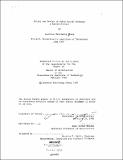Policy and design in urban social housing : a reconciliation
Author(s)
Cheng, Lawrence Kai-Leung
DownloadFull printable version (21.45Mb)
Other Contributors
Massachusetts Institute of Technology. Dept. of Architecture.
Advisor
Anne Vernez-Moudon.
Terms of use
Metadata
Show full item recordAbstract
The objective of this thesis is to understand the term " HOUSING" as a verb. This implies that housing is a process which includes three major stages. First, the planning POLICY stage determines distributions of resources, methods of production, and programs of activities. Second, the architectural DESIGN stage transforms these objectives into physical environments through technological means and spatial articulations. Third, the INHABITATION stage involves management of the resulted environment, and its use by inhabitants. The quality of the end product and the user's satisfaction with the product depend on who is making decisions in the three stages. In modern Western urban centers, the results of two centuries of industrialization and urbanization, housing for low-income groups is subsidized by government at federal and local levels. Urban social housing projects, with few exceptions, are products of a hierarchical structuring of the three stages of housing. This structure is possible only when it is controlled by a centralized authority. The problems of this rigidity in urban social housing are manifested in its financial strain on public resources, management crisis, and rapid obsolescence. Also, these problems reflect a mismatch between the needs define d by public agencies and the actual needs of the people housed. Exceptional cases to this mismatch reveal conflicts and contradictions in the present system of housing production, and suggest alternatives to achieve a dialectic and productive interaction between all three stages (POLICY , DESIGN AND INHABITATION) in the housing process. Two major issues addressed in this thesis are the characteristics of alternative housing processes and the role of the architect in such processes.
Description
Thesis (M. Arch.)--Massachusetts Institute of Technology, Dept. of Architecture, 1980. MICROFICHE COPY AVAILABLE IN ARCHIVES AND ROTCH. Includes bibliographical references.
Date issued
1980Department
Massachusetts Institute of Technology. Department of ArchitecturePublisher
Massachusetts Institute of Technology
Keywords
Architecture.